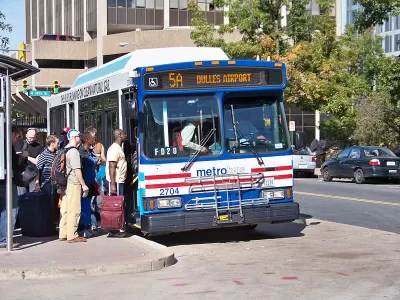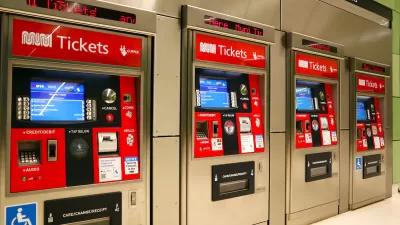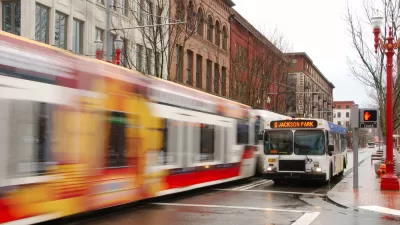Pitting Washington, D.C.’s K Street Transitway against free transit oversimplifies a more complex issue.

A proposal to provide free transit service in lieu of a new multimodal transitway in Washington, D.C. sparked heated debate among transit advocates, but now the District’s transit users may not get either one, writes George Kevin Jordan in Streetsblog USA.
“In late April, two members of the D.C. Council grabbed headlines when they proposed scrapping the multimodal, $123-million K Street Transitway project — a long-fought road redesign which would prioritize bus service by featuring two separated bus lanes between 12th Street NW to 21st Street NW, among other multimodal improvements — and re-allocate its funding towards an initiative called Metro for D.C., allowing people to board a bus within District limits for free, no matter the final destination.”
Now, a request from Washington Metropolitan Area Transit Authority (WMATA) board Chair Paul Smedberg to delay the free transit program prompts questions as to whether any transit improvements will be made at all. Jordan points out that the service-vs.-free fares debate misses the point, pointing out that it isn’t a question of a simple tradeoff.
Rather, each initiative comes with its own set of challenges and associated opportunities: “Under the surface of the debate are budgetary concerns for both the city and the WMATA, design concerns about the Transitway that some say would undermine its multimodal goals,” while the legislation that would fund the free fares program would also increase transit service. For now, “With D.C.’s budget still to be voted on, the future of both K-Street and Metro for D.C. seem to be up in the air.”
FULL STORY: D.C.’s ‘Free Fares Vs. Good Service’ Debate Isn’t What You Think

Study: Maui’s Plan to Convert Vacation Rentals to Long-Term Housing Could Cause Nearly $1 Billion Economic Loss
The plan would reduce visitor accommodation by 25,% resulting in 1,900 jobs lost.

North Texas Transit Leaders Tout Benefits of TOD for Growing Region
At a summit focused on transit-oriented development, policymakers discussed how North Texas’ expanded light rail system can serve as a tool for economic growth.

Using Old Oil and Gas Wells for Green Energy Storage
Penn State researchers have found that repurposing abandoned oil and gas wells for geothermal-assisted compressed-air energy storage can boost efficiency, reduce environmental risks, and support clean energy and job transitions.

Santa Barbara Could Build Housing on County Land
County supervisors moved forward a proposal to build workforce housing on two county-owned parcels.

San Mateo Formally Opposes Freeway Project
The city council will send a letter to Caltrans urging the agency to reconsider a plan to expand the 101 through the city of San Mateo.

A Bronx Community Fights to Have its Voice Heard
After organizing and giving input for decades, the community around the Kingsbridge Armory might actually see it redeveloped — and they want to continue to have a say in how it goes.
Urban Design for Planners 1: Software Tools
This six-course series explores essential urban design concepts using open source software and equips planners with the tools they need to participate fully in the urban design process.
Planning for Universal Design
Learn the tools for implementing Universal Design in planning regulations.
Ascent Environmental
Borough of Carlisle
Institute for Housing and Urban Development Studies (IHS)
City of Grandview
Harvard GSD Executive Education
Toledo-Lucas County Plan Commissions
Salt Lake City
NYU Wagner Graduate School of Public Service





























